- Home
- Gregory Maguire
Egg & Spoon Page 25
Egg & Spoon Read online
Page 25
Something made the light flicker. What seemed an ailment in her eyes proved, once they settled upon her, to be moths. She tried to console and humor herself: there weren’t as many as might be found, say, in a moth factory.
I will not even mention the word spider.
Elena called out to ascertain the number of other prisoners in solitary confinement. The hello that echoed back through the barrel-vaulted stone corridors was her own voice, sounding frightened.
She sat at the edge of the bed and considered her plight.
Good fortune had shadowed her steps for so long that she’d begun to mistake it for fate. She’d grown over-sure of herself and her capacity to endure.
In the interest of helping her mother, of finding milk and medicine for her, Elena had let herself become cocky. She had traded simple honesty for scheming.
And, though she could scarcely credit it of herself, she had gone before the Tsar of All the Russias and addressed him on behalf of Luka and their mother.
Let them remember this when they call my name in the roll call of the damned, she thought hotly.
I suppose you could say that Elena deserved to weep; she’d made a royal botch of it. But we all do sometimes. If we’re lucky, we weep alone. The one thing captivity can be good for: privacy.
Later, Elena allowed herself to admit the other truth.
She’d taken advantage of the accidental substitution of lives, hers with Cat’s and Cat’s with hers. She’d enjoyed the experience of feeling full. She’d been able to practice the tricks of elegance that she’d picked up from her traveling companions. She’d become seduced by comfort.
And in comfort, she’d also become aware of the appeal of the constructed world. Not just the things themselves, like well-made food set just so upon the gold-rimmed plate, but the attributes of things. The shape of rooms, the cut of gowns, the color of blossoms in porcelain vases, the elegance of boulevards, the music of unhurried conversation, the allure of foreign tongues.
When, really, the society into which she’d been born boiled down to something much like what she had now: a few mice, a few rats, a few moths, and a colony of mildew. This was her home, her legacy. With a common characteristic of poverty. She knew it for what it was now. She deserved it.
Finally she slept, or she slept again. So long susceptible to fancies about the magic world, she didn’t have the spirit to dream. She didn’t even dream of sitting on a cot in a prison cell.
She didn’t dream of walking in a cloud of stars, hoping to find her father, since no one living could help her now and only the dead could beckon her.
She didn’t know if it was hours, days, or weeks after her arrival when the sound of the stones snoring turned into the sound of footsteps. A voice said, “Up and on your feet, by the orders of the Tsar.”
Though it might be to a chopping block, she obeyed the command.
Between two guards, a monk of some sort stood there, wearing sandals and robes like the mendicants who wandered the country with begging bowls. He shuffled in with a lamp and he said to the guards, “Five minutes,” and closed the door.
The man was balding but not elderly. Tall, perhaps spindly; gaunt. He had more curiosity than kindness in his face, I regret to admit.
“We haven’t much time,” he said. “The wise men with their ancient knowledge are stumped. The witch with her more ancient magic is running hither and yon like a chicken with its head —”
“— intact on its shoulders,” interrupted Elena. “I don’t like thinking about heads severed from bodies just now.”
“I need your help. The Tsar is distracted and dubious. The great and good of Saint Petersburg aren’t paying attention. The young prince suggested that I ask you my question. He said you were cannier than the lot. And I suppose, why not? A rural child who believed enough to be granted a glimpse of the Firebird — maybe you have access to the knowledge we need. Access born of your very innocence.”
“If I were very innocent, I wouldn’t be in prison,” she pointed out.
“The other kind of innocence.”
“Native stupidity? That kind?”
“Let’s not argue over definitions. There’s too little time. The witch is leaving tonight, but she doesn’t know which way to turn. Where should she go? What is your advice to her? The influence of your intuition, please: it’s all we have.”
Elena remembered Peter Petrovich’s old bromide: Ambition without direction is like milk without a cup. But Elena hadn’t warmed to Baba Yaga. The witch had rescued Cat, but she’d also been the agent of Elena’s unmasking. “I am either too stupid or not stupid enough to have intuition. I have no advice for her.”
The monk sat down on the edge of her cot. “You are a child of farms and fields. You live closer to the weeping earth than we do. Think.”
“I can’t think. I haven’t been trained to think in some Happyweather School. Had I grabbed a Firebird’s feather, I’d have wished my father to come back to take care of my mother. But he can’t. I can’t. No one can. I have nothing to give you but my failures.”
She didn’t want him to see her eyes. Putting the prison apron to her face, she felt the lump in her pocket. The matron had let her keep her mother’s doll. “Your court has singing artificial roosters and matryoshkas as large as brown bears. My small life is only this high.” She pulled it out. “This is my only inheritance, a plaything for making stories with. I have no wisdom, and few stories anymore, either, except the story of our downfall.”
“Does this doll open? What is inside? Has it a clue? Maybe it can tell Baba Yaga where to turn.”
“It’s a long time since you’ve played with dolls. This toy has a painted mouth. It doesn’t speak.” She opened the top half of the big mother and pulled out the other six dolls. “They have no secrets.”
“Your mother trusted you with this. Show me.”
“My mother had no reason to trust me. I’ve failed thoroughly.” She opened the second mother and removed her five descendants.
“These are like eggs, each one holding the future. Show me more.”
“The last one is as mute as the others, I promise you.” She uncapped the third mother and out slid the four remaining dolls. Then the fourth, and the fifth, and the sixth, in turn.
“Are they telling you anything? Which way should Baba Yaga go to discover the ailment that tumbles the seasons, and floods the world, and frightens the missing Firebird so much that he refuses to be born?” His voice grew hushed. “They will open the door in a moment. I do not know if they will let me take you with me. Is the sixth mother telling you a secret?”
Elena could hardly stand this talk of mothers. “She’s saying she’s pregnant. The seventh is a baby, and knows nothing, like all babies.”
“Ah, babies in their influence. Boy or girl?”
She shook it out. It lay in her palm like a quail egg. Natasha Rudina always called for Luka first. First Luka, then Alexei. Her only daughter was in prison. “It’s just a baby. Good luck to it.”
“What does it say?”
“It says nothing — it’s asleep!” In frustration she shook it at him. They both caught the tiny pin-like rattle. She’d never heard it rattle before. Well, she’d never shaken it. She knew better than to shake a baby.
“What is it saying?” He grabbed her wrist. He frightened her. “Open it.”
“The baby doesn’t open. It’s the last one.” To prove it, she twisted the baby’s head and removed it from its neck. “Oh. Oh, my. I never knew it could do this.”
They both peered at it in the gloom. “Is it a tiny clock?” she said. “Is it telling me it is time to die?”
“No, it isn’t a clock. But it is a message, I think. It is a compass.”
“And what does it say —?”
“It says,” replied the monk with a weary satisfaction, “North.”
She bade good-bye to the rats, to the mice and the mildew. The moths followed her into the corridor as she, in turn, followed the mo
nk and the two guards. Soon she was standing before a desk in a room with windows. That gibbous moon, stouter than before, swam beyond iron bars.
The prison governor initialed some papers and then said, “You sign here.”
Elena didn’t know how to write her name. The monk signed for her.
The governor said to Elena, “Our brother Uri Metchik here brings instruction from the Tsar to commute your sentence from imprisonment to banishment. The good monk will escort you as far as the Archangel road. You can’t have your ball gown back. You can keep the tunic and leggings and apron we gave you. Pick a coat from that pile in the corner. You’ll leave with boots, gloves, a shawl, two portions of Mama Prison’s Best Loaf, and a threat of execution should you ever appear within the walls of our soggy city. You’re welcome.”
“Can’t we hurry this up some?” The monk looked over his shoulder.
“I can’t express my gratitude.” But was Elena speaking in irony or earnestness? She admired a certain tartness she heard in her own voice. At least through her misadventures she’d found that. Not such a bad thing.
The monk was tapping his sandaled foot. “Paperwork. Get on with it.”
The governor applied a wax seal and took a ring of iron keys from a hook. Elena followed him and the monk into the courtyard through which she’d arrived. “How long did those papers say I have been here?” she asked the governor.
“Since last night. Oh, but we’ll miss you. You cheered the place up with your winning ways.”
“Well.” She threw back her shoulders. “I’d say I came through that ordeal pretty well. Now to the next one.”
“Hurry,” said the monk, and the governor took his time. Even so:
The world outside —
She watched it shape itself in the moonlight as the dogs were called back and the gates were swung open. I can hardly write this part, I get emotional. Liberty is costly but so glamorous.
“Saint Nicholas be on your right hand,” said the governor to her.
“No need,” said the monk. “I will be at her right hand.”
They paced the quiet streets. The monk said, “Don’t dawdle. Don’t look back.”
“Are you going to abandon me in the wild?”
“We’re in luck. Anyone who might be out tonight is at the festival. With such a diversion, you can easily steal away.”
“I don’t steal anything anymore. I’ve learned my lesson. But why should we scurry like brigands? No law is higher than the Tsar’s decree.”
“Indeed. But he doesn’t know he has set you loose.”
“What do you mean?”
“Will you keep up? The Tsar’s instruction was forged. He hasn’t commuted your sentence. You’re now on the run from the law. I risked my freedom and my life to rescue you from prison.”
“I didn’t ask you to do that! Now I’m worse off than before, a fugitive.”
“Worse is to come unless you continue to help. Child, you’re the one who found the Firebird’s egg. And now you’ve told us where to turn. Your influence is still required. Hurry.”
They crossed a canal behind the palace. The Hermitage Bridge. A musical pressure nearby, chatter and violins in the cold. But they were beyond sight of the festivities, and tonight few people wandered down this side street. The monk stopped. He threw off his cowl. “We’re here,” he hissed. “Where are you?”
Something in the shadows moved. Elena started back. That section of shadow straightened up and became more distinctive. “Prince Anton!” she said.
“We’re all ready for you,” he replied. “The League of Freed Prisoners welcomes you on board.”
“What? Who? Are you mad?”
The boy hopped to the top of the stone balustrade, stepped off into the air, and disappeared, but Elena heard no splash. Meanwhile, along the quay, a quartet of soldiers was approaching on some campaign. The monk felt the menace and he helped Elena to scramble up on the rail. “I recommend you follow the boy. It will go far worse for you if you’re caught a second time, and bad news for me if I am found with you.”
Hurry, will you?” said the boy’s voice from below the bridge. As wary of river water as she was of floods, Elena knelt on the balustrade and looked over.
Prince Anton’s legs were spread-eagled across the ridge beam of Baba Yaga’s house, which was kicking its feet to keep from being pulled out of the Winter Canal — or the Winter Groove, as some still call it — and toward the Neva River.
“This sweetheart’s itching to cast off,” hissed Prince Anton. “Jump aboard!”
“But I need to go home to my mother,” she said. “It may be too late.”
“Quick, I think they see us,” said the monk. “Jump, jump now, unless you want to return to prison, or worse. Go with them, it’s your only chance.”
She didn’t want that. She could only say, “But where?”
“You know. The North,” the monk replied. “Tell Baba Yaga.”
He couldn’t see Dumb Doma; he was, after all, a grown-up. The monk had to trust the Prince, whom he thought both trying and untried. Entirely clear of a moral intelligence like his own. “From here, may the angels keep you,” whispered the monk. He strode across the bridge toward the quay. The soldiers saw him. They didn’t come after him yet.
Elena had no reason to obey Brother Uri, but she didn’t want to be apprehended by soldiers again. Reaching for Prince Anton’s hand, she dropped the few feet to the roof of the izba. Her personal eclipse of moths descended, too. There she crouched beside the boy as Dumb Doma slid from the bridge.
Suddenly a dormer unfolded itself out of the slanting roof. Blurt, slap, jolt, and there it was. Like a soufflé in a magic oven, rising to perfection in ten seconds. Fwoop! A casement window opened with a slam, and the head of that wicked creature appeared. Baba Yaga, none other.
The witch: “Get inside. We have no time to waste. If you linger at the souvenir stand, Baba Yaga’s Rescue Coach will leave without you. And no refunds!”
“I want to ride up here,” said Anton. “Tally-ho, and giddyup, and so on. I need to kick this vessel in the right direction. We’ll head for the Moyka River and avoid the fuss on the Neva. Not that there are children out at this hour.”
Elena faced the threat of pitching into the river. So, against her better judgment, she climbed in the window.
The witch in Cat’s book had been more horrible to look at, but Elena soon decided that the actual Baba Yaga was less reliable — which seemed, on the balance, more dangerous.
Elena followed the witch down a set of steep steps. Sitting cross-legged on the floor in a corner of the room, with a kitten on her lap: Cat.
“Oh, you,” said Elena. “I suppose I’ve brought more trouble for you?”
Cat, unsmilingly: “No, this time I’ve chosen trouble all by myself.”
“Thank you for joining us at Saint Petersburg,” said Baba Yaga. “Depending on your ‘advice,’ your peasant ‘intuition,’ as that Brother Uri promises you possess, we’ll chart our course and get under way momentarily. Our final destination, which we hope to avoid, is Doom.”
“Who are you to kidnap me? This is one captivity exchanged for another.”
Cat stood up, dumping the kitten on the floor. “Elena, this is, well, you know by now. Um, and this is Elena Rudina,” she said to the witch.
“We were introduced at that boring soirée,” snapped the witch. “I know who she is, and the boy. And I’ve taken your measure, too, Mademoiselle. It’s a good thing you decided to help rescue your friend. I abhor a stinker. What is the advice, child, that Brother Uri promises you will have for me?”
“I think he’s nuts,” said Elena, “but he thinks the word is North.”
The witch turned away to study an upside-down wall map. “Ultima Thule, Ultima Thule, where summers are bummers and winters unruly.” The room rocked. The only sound a faint lapping, as around docks when a boat passes.
It’s hard to imagine which of the girls felt more awkward. Think about
it. Elena, given the chance, had stolen Cat’s identity and brashed her way into the Tsar’s festival. Then, when Elena’s deception was unveiled, Cat had refused to stand up for her, to defend her.
Neither girl liked the truth about herself at this moment.
It seems there is no shortage of regret among the young — but then, they are young, they make mistakes. They have time to correct them and the courage to admit their failings aloud. Adults should try it. But frankly, I think it’s a miracle that adults can manage to speak to one another at all, and that the entire species doesn’t take a universal vow of silence. Some days I wish it would.
The girls stood square in their opposite quietudes, several feet apart. Cat straightened her shoulders as if a headmistress were chastising her about her posture. Elena twisted her hands behind her back. The first words of apology are the hardest to get out. Elena, who was after all the one with a maternal compass in her pocket, plunged ahead.
“Thank you for coming to rescue me,” she said, and added, “and I didn’t thank you for that half apple. Back there. In Miersk. Thank you.”
“I never asked you what your name might be,” said Cat. “If I’d bothered to do that, I might have known you better. I might have cared more about what happened to you.”
“You can ask now.”
“Elena, what is your name?”
A tickle rose in Elena’s throat. She thought it was dust but actually it was a chuckle, a sound so foreign in her own throat that she hardly recognized it. “Lately I’ve been going by the name of Ekaterina,” she replied. “But when my mother was wandering in her mind, she often called me Luka or Alexei. So it doesn’t matter. Anyway, she never called for me without asking for her sons first, so my name doesn’t signify much. I don’t even know what it means.”
Cat replied, “Well, your mother called me Elena, and she held my hand, and nobody’s mother ever did that for me before.” And continued: “And she didn’t call for her sons first, that time. Just one word that morning: Elena.”
“I object to all this sentiment,” called Baba Yaga over her shoulder. “It curdles the mayonnaise.” They paid her no mind. They had run to each other’s arms at last. Their wet cheeks rubbed against each other, finally starting their friendship, and finishing the job of apology and forgiveness that words could not handle.

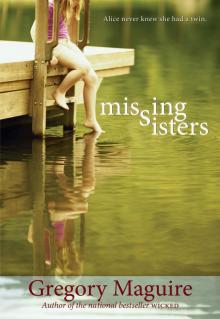 Missing Sisters
Missing Sisters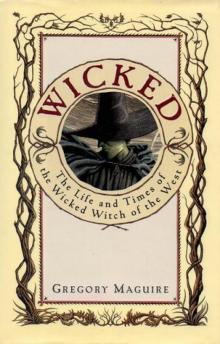 Wicked: The Life and Times of the Wicked Witch of the West
Wicked: The Life and Times of the Wicked Witch of the West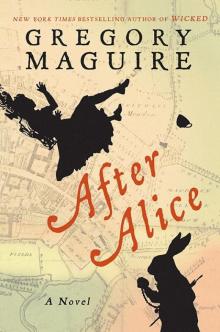 After Alice
After Alice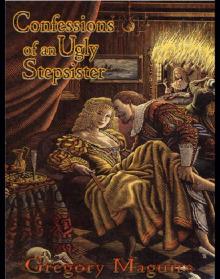 Confessions of an Ugly Stepsister
Confessions of an Ugly Stepsister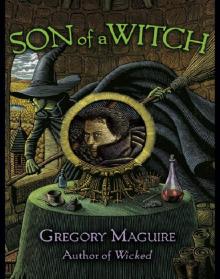 Son of a Witch
Son of a Witch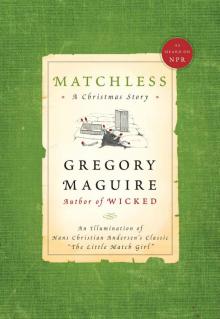 Matchless
Matchless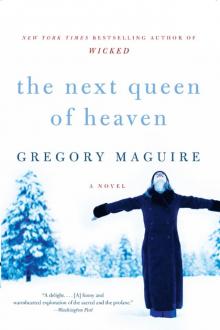 The Next Queen of Heaven
The Next Queen of Heaven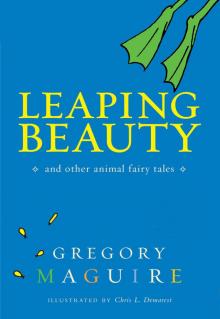 Leaping Beauty: And Other Animal Fairy Tales
Leaping Beauty: And Other Animal Fairy Tales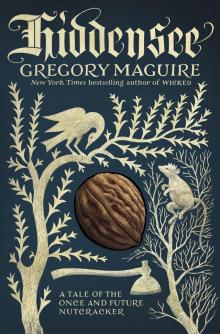 Hiddensee: A Tale of the Once and Future Nutcracker
Hiddensee: A Tale of the Once and Future Nutcracker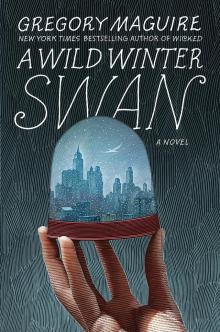 A Wild Winter Swan
A Wild Winter Swan Egg & Spoon
Egg & Spoon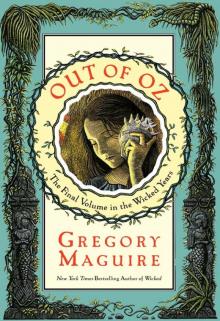 Out of Oz
Out of Oz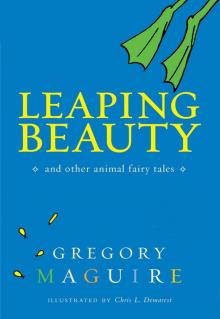 Leaping Beauty
Leaping Beauty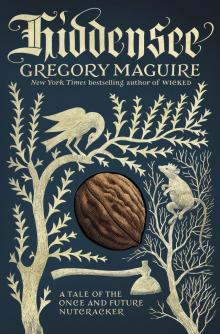 Hiddensee
Hiddensee The Wicked Years Complete Collection
The Wicked Years Complete Collection The Next Queen of Heaven: A Novel
The Next Queen of Heaven: A Novel